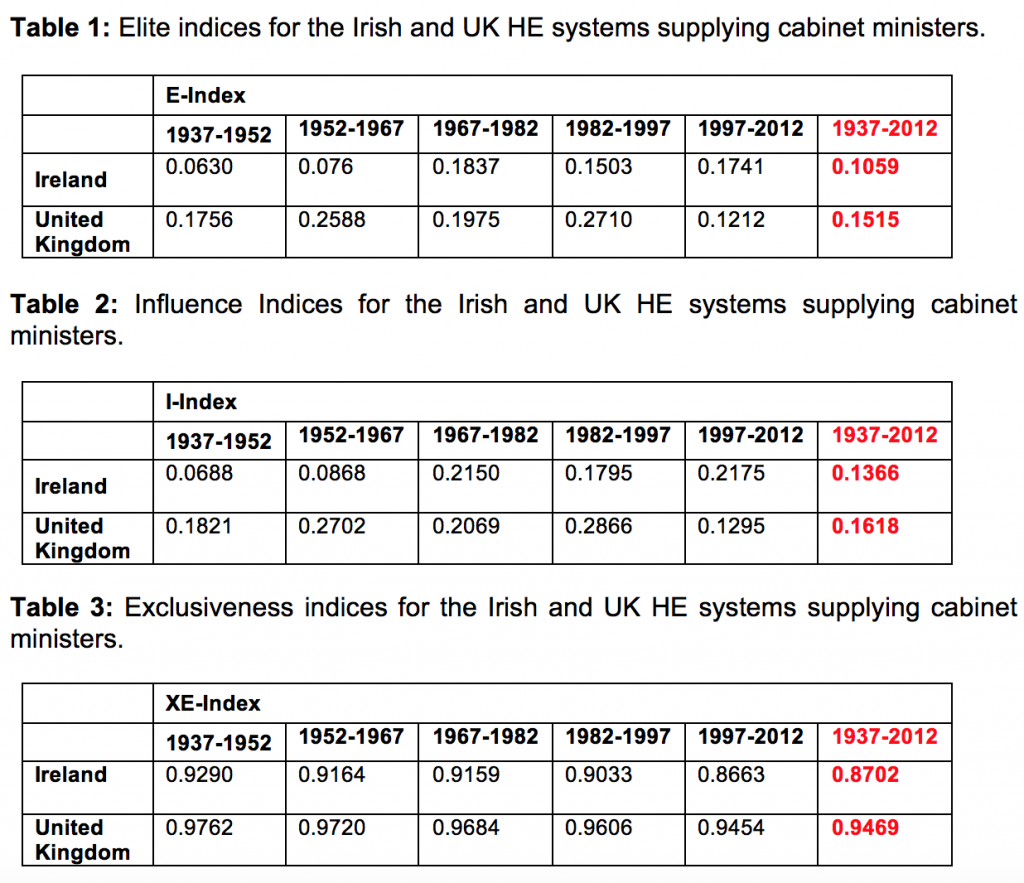

 Sharon Feeney, John Hogan, and Brendan K. O’Rourke compare the influence, exclusiveness, and eliteness of the Irish and British higher education systems in the production of governing political elites between 1937 and 2012.
Sharon Feeney, John Hogan, and Brendan K. O’Rourke compare the influence, exclusiveness, and eliteness of the Irish and British higher education systems in the production of governing political elites between 1937 and 2012.
Had he been elected, Jeremy Corbyn would have been just the fourth British prime minister since 1945 not to be an Oxbridge graduate. In a country of 65 million citizens, and over 160 universities, British prime ministers’ higher education seems to be moulded, almost exclusively, by these two institutions of excellence.
Social uniformity and groupthink amongst powerful cliques, can make them blind to alternatives. At the same time, their exclusiveness makes the wider society suspicious of any contribution they make. Yet, networking is seen as valuable in building trust, exchanging ideas, making connections, and acting cohesively. There is also the argument that we want the ‘best minds’ to be our leaders, and the assumption is that the best minds are forged in the ‘best’ institutions of learning.
Between 1937 and 2012, there were 340 cabinet ministers in the UK, 290 of whom were graduates. Of these 290, 182 were Oxbridge graduates. In Ireland, in the same period, there were 157 cabinet minister, 106 of whom were graduates and of these 66 graduated from either from University College Dublin (UCD) or Trinity College Dublin (TCD). Thus, just two universities, in both counties, account for almost the exact same percentage of cabinet ministers who were university graduates over three quarters of a century – 62%. The standout university in the UK is Oxford, which accounts for 119 of the 290 university educated British ministers in the period; while in Ireland it is UCD, accounting for 54 of the 106 graduates in cabinet.
Yet, these factoids, while persuasive, make it difficult to get a real sense of how concentrated an elite’s formation is, especially in comparison to others. When comparing top politicians’ higher education formation across countries some obvious complications arise: the populations and their age profiles, the numbers attending higher education, the numbers and shares of higher educational institutions, and the size of the political elite. To help gain a better comparative understanding, we have set out a range of indices that facilitate a direct quantitative comparison of elite formation systems.
Influence and exclusivity elements of elite formation systems
The indices we use produce results that are comparable across institutions, jurisdictions, and across time periods (both long and short). The indices capture how elite a system is in the formation of a societal group by measuring the influence and exclusivity of that system. In turn, the influence of a higher education system comprises the proportion of cabinet ministers associated with institutes that produce them and the limited number, or “fewness”, of those institutions. Exclusivity is also comprised of two aspects. First, the more alternatives there are to any one institute, the more exclusivity there is. Second, the more unequal the shares of each institution, the more exclusivity there is. The eliteness of a higher education system is the linked combination of influence and exclusivity.
We found that the higher education system in the UK that produced cabinet ministers was more elite and more influential than the Irish system over the period 1937-1997 (see Table 1); but this situation was reversed thereafter. This reversal in the period 1997-2012 was connected with New Labour coming to power in the UK in 1997. Tony Blair, and later Gordon Brown, filled their cabinets with ministers who graduated from a range of British higher education institutions, rather than just Oxbridge, as had been the wont of previous prime ministers.
The British higher education system was also just a little more exclusive than the Irish system in each of the five time periods we examined. The more rapid decrease in the exclusiveness of the Irish system, since the early 1980s, was due to the number of higher education places in each Irish higher education institution growing rapidly, while the relevant general population of the country expanded more slowly. It was also a time when the number of places in UK higher education institutions expanded at a slower rate in comparison to the relevant general population and, of course, in comparison to Ireland—as borne out by the results in Table 3.
Until now, we might have had the general impression that the Irish higher education system was less elite than its UK counterpart. After all, previous work has shown the UK political elite to have a much more elitist post-primary education than is the case in Ireland. While some of the factoids presented above might have challenged such prior assumptions, their variety and multidimensional character made it easier to focus on those elements of the story that confirms one’s own prejudices.
Our indices constitute a significant new tool for use in comparative elite studies, bringing a level of transparency and comparability that was so far absent. In the case of both countries, the results underline the general view that only a few universities dominate when it comes to high political office – these are Oxford in the case of the UK and UCD in Ireland.
Although here we have focused on comparing the higher education political elite formation systems in Ireland and the UK, our indices can also be employed across a much broader range of countries, or even within individual countries, and over varying and overlapping periods of time, to examine a vast array of different types of elites and their formation systems. Additionally, the data we have amassed on UK and Irish higher education systems would be of use in the study of any elite groups in those countries.
______
Note: the above draws on the authors’ forthcoming article in the British Educational Research Journal, available through early view.
 Sharon Feeney is Head of Learning Development, College of Business, Dublin Institute of Technology.
Sharon Feeney is Head of Learning Development, College of Business, Dublin Institute of Technology.
 John Hogan is a Research Fellow at the College of Business, Dublin Institute of Technology.
John Hogan is a Research Fellow at the College of Business, Dublin Institute of Technology.
 Brendan K. O’Rourke is a College of Business Lecture and Head of the Business, Society and Sustainability Research Centre at the Dublin Institute of Technology.
Brendan K. O’Rourke is a College of Business Lecture and Head of the Business, Society and Sustainability Research Centre at the Dublin Institute of Technology.










Jeremy is so refreshing! He does not fall into the category of being traditionally well educated. It has to be conceded that he attended grammar school and was privately educated before that, but he cannot be accused of being a member of the elite since he did not do well at his A levels and dropped out at his polytechnic from his course on Trade Union studies. The country obviously needs more genuine non-profits like him unencumbered by a decisive good education!
Your point is well made. The issue is that he is not in the UK government and as a result his info would not reduce the level of eliteness of the elite UK universities as we measured them here. If he does become part of the UK government at some stage that would serve to alter the three indices.